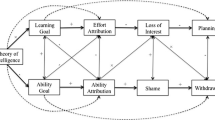Abstract
Recent research suggests that men and women account for failures differently. Competent, self-aware men discount failures; competent, self-aware women accept them. This style of accounting for failure outcomes in achievement has been explored in studies of attribution and, more recently, the expectancies an individual holds regarding the outcome (to fail or succeed). The theories do not predict acceptance of failure by competent, self-aware individuals. The incongruent results have been consequently explained as a sex difference. Closer evaluation of the research, however, indicates that most women expect failure rather than success, and that this is a learned expectation. This study attempted to answer whether an exposure to success experiences would alter this expectancy and, if so, whether women would then discount failures in a self-serving manner as men do. Through a manipulation of success and failure outcomes using anagram tasks, it was demonstrated that, given an expectation to succeed, women did use systematic biased attributions to account for failure. These findings have significant implications for attribution research and for our understanding of women's attitude towards achievement and ability to maintain a sense of well-being when faced with failure.
Similar content being viewed by others
References
Deaux, K. (1976). Sex: a perspective in the attribution process. In J. Harvey, W. J. Ickes and R. Kidd (eds.), New Directions in Attribution Research. Volume 1, pp. 335–352. Hillsdale, NJ: Erlbaum.
Deaux, K. & Farris, E. (1977). Attributing causes for one's own performance: the effects of sex, norms, and outcome. Journal of Research in Personality, 11, 59–72.
Dweck, C. & Goetz, T. (1978). Attributions and learned helplessness. In J. Harvey, W. J. Ickes and R. Kidd (eds.), New Directions in Attribution Research. Volume 2, pp. 157–179. Hillsdale, NJ: Erlbaum.
Feather, N. T. (1968). Change in confidence following success or failure as a predictor of subsequent performance. Journal of Personality and Social Psychology, 9, 38–46.
Feather, N. T. (1969). Attribution of responsibility and valence of success and failure in relation to initial confidence and task performance. Journal of Personality and Social Psychology, 13, 129–144.
Gilbert, L. (1978). Internal attribution for success and high achievement motivation for men and women. Dissertation Abstracts International, 38(11-B), 5645.
Gilmour, T. & Minton, H. (1974). Internal versus external attribution of task performance as a function of locus of control, initial confidence and success-failure outcome. Journal of Personality, 42, 159–174.
Harvey, J., Ickes, W. J. & Kidd, J. (eds.) (1976). New Directions in Attribution Research. Volume 1. Hillsdale, NJ: Erlbaum.
Harvey, J., Ickes, W. J. & Kidd, J. (eds.) (1978). New Directions in Attribution Research. Volume 2. Hillsdale, NJ: Erlbaum.
Health Sciences Computing Facility, Department of Biomathematics, School of Medicine, University of California, Los Angeles (1977). BMDP Biomedical Computer Programs, P-Series 1977. Berkeley, CA: University of California Press.
Ickes, W. J. & Layden, M. A. (1978). Attributional styles. In J. Harvey, W. J., Ickes and J. Kidd (eds.), New Directions in Attribution Research. Volume 2, pp. 119–152. Hillsdale, NJ: Erlbaum.
McMahan, I. (1973). Relationship between causal attributions and expectancy of success. Journal of Personality and Social Psychology, 28, 108–114.
Page, R. (1973). The effects of self -esteem and sex on attributions by actors and observers regarding the causes of success and failure. Dissertation Abstracts International, 34(2-A), 863.
Rotter, J. B. (1966). Generalized expectancies for internal versus external control of reinforcement. Psychological Monographs, 80 (Whole No. 609).
Ryckman, R. & Sherman, M. (1973). Relationship between self-esteem and internal-external control for men and women. Psychological Reports, 32, 1106.
Weiner, B. (1974). Achievement Motivation and Attribution Theory. Morristown, NJ: General Learning Press.
Author information
Authors and Affiliations
Rights and permissions
About this article
Cite this article
Semkow, VJ.A., McCarrey, M. How do women account for failure when they expect success?. Current Psychological Research 2, 161–170 (1982). https://doi.org/10.1007/BF03186756
Accepted:
Published:
Issue Date:
DOI: https://doi.org/10.1007/BF03186756




